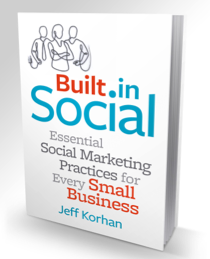
Would you like to speed up your content creation process, while concurrently making it more relevant to your audience?
While Google still loves long-form magazine style content, it is certainly better to create short form content than nothing at all.
However, instead of considering short-form content a compromise, recognize it for what it is. This is a win-win for your business and its on-the-go audience that often only has time for a snack.
It’s no coincidence that the fastest growing social media channels are those that deliver the bite-sized content that active people crave. For businesses, we’re talking about Instagram, Pinterest, and Vine.
Benefits of Short Form Content
In addition to participating in these highly active communities that were specifically designed for short form content, they integrate seamlessly with Facebook and Twitter, thereby multiplying your efforts.
So, instead of publishing directly to Facebook, consider publishing to Instagram and then link that message to both Facebook and Twitter. That gives you an easy three for one.
Additional Benefits of Short Form Content
- Takes less time
- Builds the content creation habit
- Readily shareable
- Consistency increases engagement
- A link is a link
Let me elaborate on that last point.
When building your online presence, every link counts. In other words, both a short and long piece of content offer you one link that leads back to your primary website. Obviously, when you consider your investment in time, it’s easier and more economical to earn inbound links with short form content.
In fact, it is arguable that a heavily shared video on Pinterest, Instagram, or Vine will drive more traffic than a long form article. It all depends upon the nature of your business, social marketing strategy, and the behaviors of your communities.
If you want to learn more about Pinterest, Instagram, and Vine, go to Social Media Examiner and search for the respective channels. You will discover informative articles and podcasts.
Personally, I learn more from the in-depth podcasts. Of course, you can also Google these channels or their experts. I’ve found Cynthia Sanchez to be the top expert on Pinterest and Sue B. Zimmerman for Instagram.
Design Your Short Form Strategy
For short form content to work for you, it has to be planned.
Here are some ideas that I pulled right out of Built-In Social: Essential Social Marketing Practices for Every Small Business. (This is page 60 if you already have a copy).
- The how-to
- Expert viewpoints or perspectives
- Interviews
- Product or service reviews
- Trends and best practices
- Helpful tools, tips, and techniques
- Business promotions
Obviously, you would not want to exclusively focus your content on business promotions. However, as one example, you could certainly combine #1 and #6 to show your community how to get the most from your products and services, which effectively is a subtle form of promotion.
Taking this a step further, let’s assume you want to encourage more sign-ups for an event you are hosting. Build a list of a dozen or so tips that are representative of the benefits one will learn at that event. Then roll them out as a series of teasers that gives your audience a sample of what they can expect by attending.
Just be sure to focus on being helpful, rather than promotional.
One Business Channel
Remember that while there are many social networks, they have to collectively work together as one business channel.
Therefore, you should ideally develop a balanced mix of both long and short-form content to give your audience, as well as Google and the other search engines, exactly what they want.
To put this into perspective, you may find The Best Blog Post Length Test interesting. It helps to put short and long into perspective, so that you can use them to more effectively tell your stories.
How is your business using the new short form social media channels? Please share your thoughts in a comment.
About the Author: Jeff Korhan, MBA, is the author of Built-In Social: Essential Social Marketing Practices for Every Small Business – (Wiley 2013)
He helps mainstream businesses adapt their traditional growth practices to a digital world. Connect with Jeff on LinkedIn, Twitter, Facebook, and Google+.


